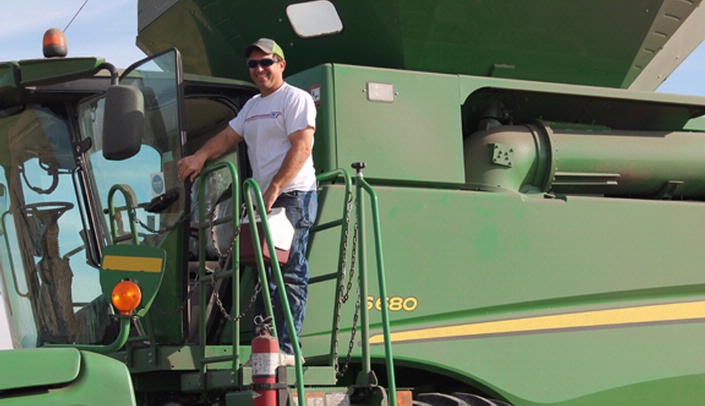The colleges of nursing and allied health professions at the University of Nebraska Medical Center have conducted a series of collaborative projects studying ways in which web- and technology-based interventions can help rural women improve their own health — but what about rural men?
They face many of the same health problems and disparities as their female counterparts. The UNMC team set out to see if technology, with a few tweaks, could similarly help rural men.
A pilot study of 12 men in rural northeast Nebraska gave participants FitBit One activity trackers, targeted text-message reminders, and a self-monitoring app to log their food intake and to monitor the progress of their (anonymous) fellow participants.
The study, "Acceptability of mHealth Technology for Self-Monitoring Eating and Activity among Rural Men" tracked 12 men in northeast Nebraska, ages 40-67, who were either overweight or obese, for 21 days. Nine of the 12 men wore the monitor all 21 days, two wore it 9 and 15 days, respectively, and one lost the monitor.
The study, which was published recently in the journal Public Health Nursing, was the first known study involving text messages as an intervention for rural men. Its goal was to examine the feasibility and acceptability of the use of health-related text messages and an activity monitor with its companion app to self-monitor eating and activity as perceived by rural men.
"The opportunity to work with rural men and learn their preferences for mHealth (mobile health) technology use in self-monitoring eating and activity has been invaluable," said Christine Eisenhauer, Ph.D., co-principal investigator of the grant and assistant professor in the UNMC College of Nursing Northern Division in Norfolk.
"We have applied the men’s feedback into the design of our upcoming study to ensure that the self-monitoring technologies are relevant to rural men and usable across their varied work roles and settings. Our next step is to determine how effective these self-monitoring technologies are in achieving weight loss and weight maintenance among rural men."
Participants responded that while there were kinks to work out, the activity trackers kept them motivated, the text messages were largely well received and the technology mostly easy enough to use.
"When I get (texts) in the mornings, it's kind of a nice thing to see someone say something motivational," one participant said.
Weak cell signals in rural areas meant sometimes texts were late. In single-computer households they had to wait until others got off the Internet. But, family and even co-workers were supportive, even troubleshooting the technology.
Some admitted to being so hooked, they checked their steps five times a day. But, trackers fell off when doing jobs involving stooping or carrying. And they didn't measure the true physical difficulty of some farm tasks or award 2,000 steps for tractor vibration.
The calories app had numbers for fast food, but not, as one participant said for "Tater-Tot casserole or T-bone the size of a dinner plate."
Participants likely got in more steps during the study period if it was during the "non-peak" farming season. Busy times make it tougher to live healthy.
"You go check cows in the middle of the night and you grab a pop and a sandwich," one participant said.
Same with inactive leisure activities, like sitting in a deer stand. "I gain 30 pounds every deer season," one said.
They enjoyed comparing their activity with other participants, and would like it even more, "If you got a group of people that you knew and who knew everybody and it was a competition," one said. Like fantasy football!
Likewise, investigators strived to maintain a masculine tone with the study's messaging, leavened by humor, to better reach the men. "Aerobic activity," for example, didn't connect.
"I don't do aerobics," one participant said.
The study was funded by the College of Allied Health Professions Pilot Grant Award, the Pullen Development Account and the Northeast Nebraska Fund for Excellence.
Patricia Hageman, Ph.D., professor, physical therapy education, in the UNMC College of Allied Health Professions, was co-principal investigator on the grant. Other collaborators included: Sheri Rowland, doctoral student, UNMC College of Nursing; Betsy Becker, D.P.T., College of Allied Health Professions; Susan Barnason, Ph.D., College of Nursing Lincoln Division; and Carol Pullen, Ed.D., College of Nursing Omaha Division.
We are Nebraska Medicine and UNMC. Our mission is to lead the world in transforming lives to create a healthy future for all individuals and communities through premier educational programs, innovative research and extraordinary patient care.
